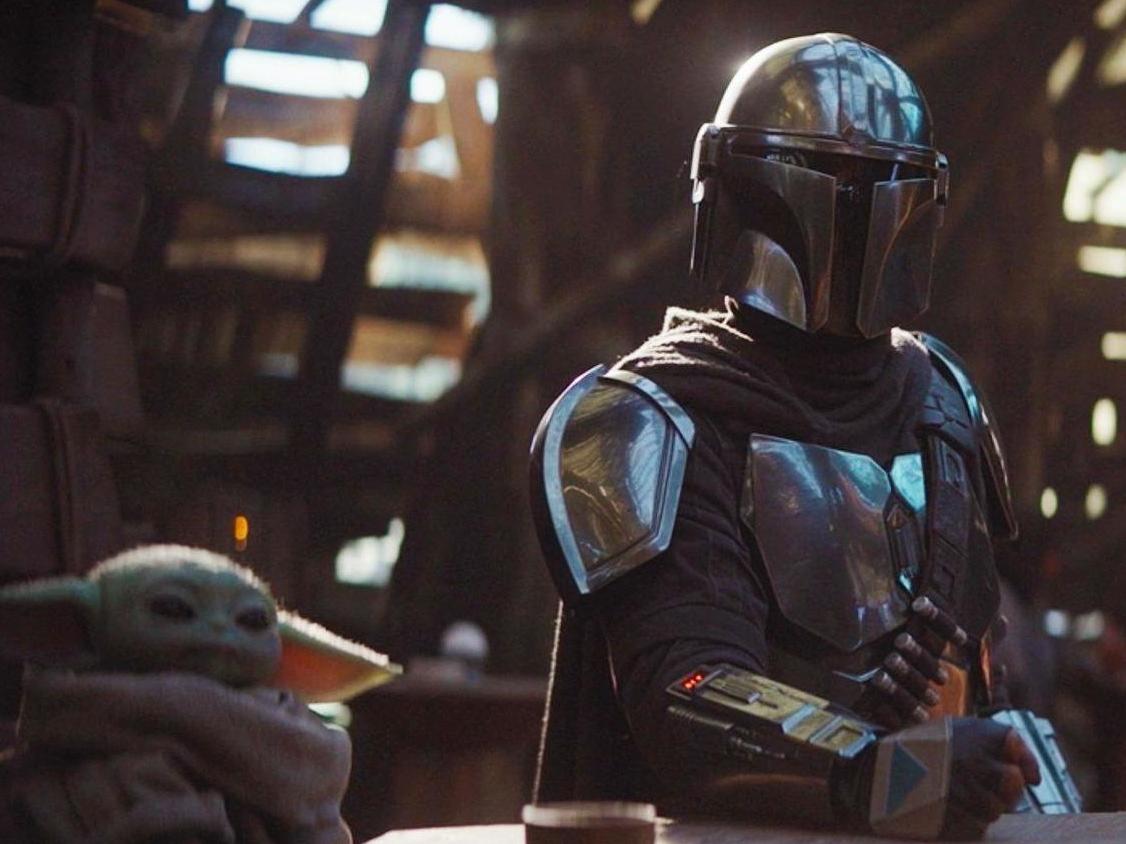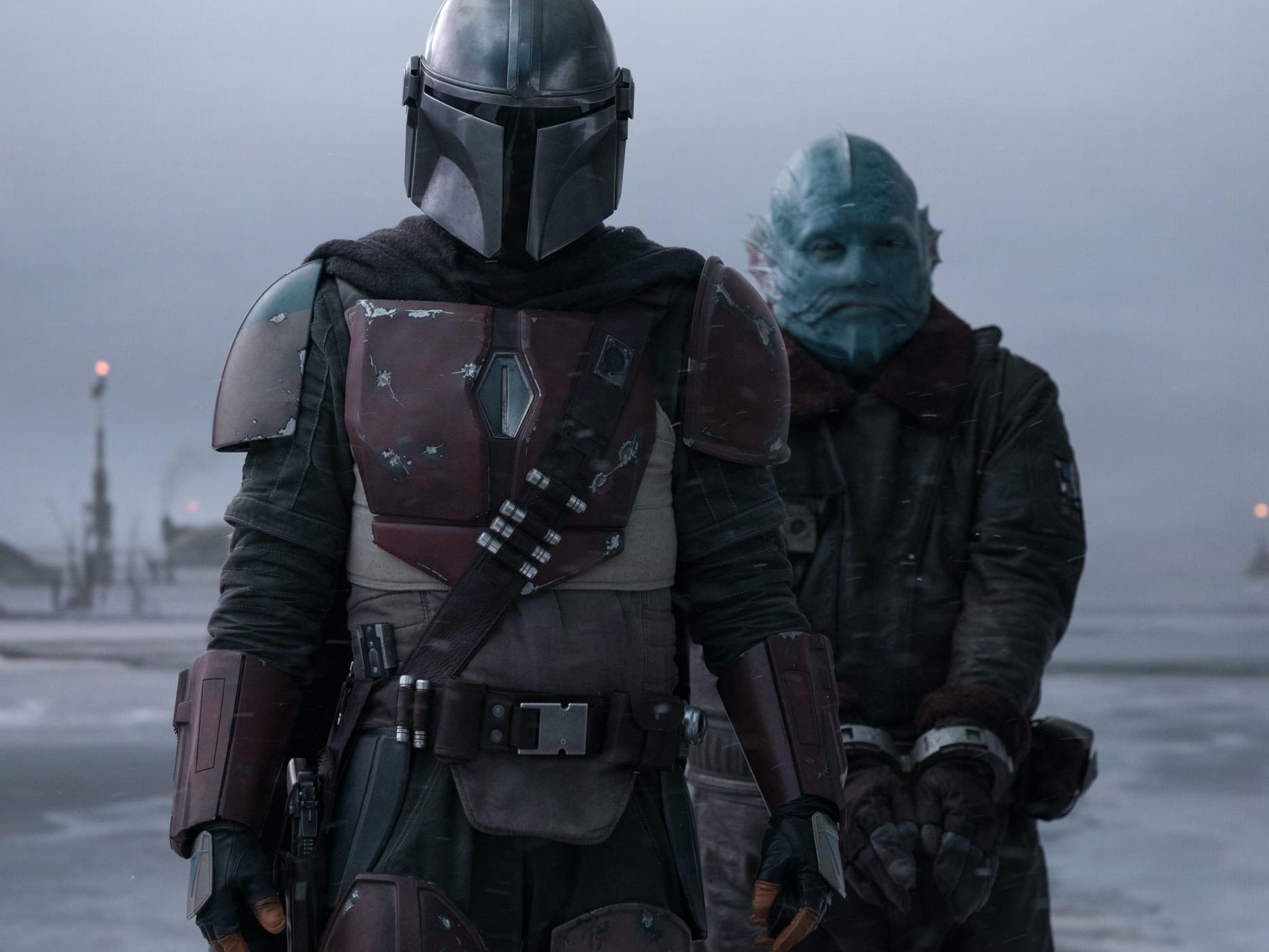The Mandalorian is evidence that Star Wars still has a pulse
After the triple whammy of disappointment that was The Force Awakens, The Last Jedi and The Rise of Skywalker, the new Disney+ series is our only hope, writes Ed Power

Your support helps us to tell the story
From reproductive rights to climate change to Big Tech, The Independent is on the ground when the story is developing. Whether it's investigating the financials of Elon Musk's pro-Trump PAC or producing our latest documentary, 'The A Word', which shines a light on the American women fighting for reproductive rights, we know how important it is to parse out the facts from the messaging.
At such a critical moment in US history, we need reporters on the ground. Your donation allows us to keep sending journalists to speak to both sides of the story.
The Independent is trusted by Americans across the entire political spectrum. And unlike many other quality news outlets, we choose not to lock Americans out of our reporting and analysis with paywalls. We believe quality journalism should be available to everyone, paid for by those who can afford it.
Your support makes all the difference.Star Wars fans are an excitable bunch at the best of times. The last several years have pushed many to breaking point. First came 2017’s atrocious The Last Jedi, where director Rian Johnson aimed a laser cannon at the canon of Star Wars itself. And then, just before Christmas, the fanbase’s eyebrows were collectively singed by the massive, exploding Star Destroyer of a blockbuster that was JJ Abrams’ The Rise of Skywalker.
Skywalker was a slowly disintegrating mess, deficient in logic and with far too much of a pained Daisy Ridley – looking as if she urgently needed the loo – opposite a peeved and whiny Adam Driver as soppy super-villain Kylo Ren. Months later, more than a few diehards still break out in prickles of irritation just thinking back to it.
The consensus was that Disney, which pumped out the new Johnson/Abrams trilogy after acquiring George Lucas’ galaxy far, far away in 2012 for $2.2bn, had potentially ruined Star Wars forever. Yet it turned out that hope was not entirely lost. Even as Rise of Skywalker and Abrams drove a lightsaber through the heart of the Jedi jamboree, over on the Magic Kingdom’s new Disney+ streaming platform, something quietly miraculous was unfolding, like a tiny green baby wriggling free of its swaddling.
Live action, serialised Star Wars was coming to the small screen for the first time in the form of Jon Favreau’s The Mandalorian. And the big plot twist was that it wasn’t terrible. Actually, it was rather good. And not just because of Baby Yoda, the cutesy break-out sensation who briefly staged a one-alien takeover of the internet.
Disney+ finally touches down in the UK on Tuesday after an unfathomable delay of nearly six months. As it does so, its flagship series crosses the Atlantic cloaked in the unknown. Because there’s no such thing as the internet, and not a single person in the UK watched the entirety of The Mandalorian when it ran before Christmas...

When will Baby Yoda make its appearance? Will Pedro Pascal’s eponymous intergalactic bounty hunter ever take off his helmet? What sort of character is esteemed German art-house director and documentarian Werner Herzog portraying?
For all we know, Baby Yoda is the villain and season one concludes with the emerald infant lopping off the Mandalorian’s head with a lethal but very cute lightsaber. As I said, I haven’t seen The Mandalorian – and neither have you. Anything is possible.
What we do know is that The Mandalorian strips away much of the latter-day clutter from Star Wars. It features episodic storytelling and is influenced by lone-gunslinger spaghetti westerns rather than Marvel movies (Ludwig Goransson’s score self-consciously references Ennio Morricone’s soundtracks for Sergio Leone). We know, too, that Star Wars fans in North America – and the Netherlands where Disney+ launched on a trial basis before Christmas – have hailed The Mandalorian as evidence that Star Wars still has a pulse. In a universe of duff sequels and prequels, it’s our only hope.
It is true that ever since George Lucas’s notorious prequels trilogy kicked off with 1999’s The Phantom Menace, Force fanatics have earned a reputation for hating on the franchise even more fiercely than casual consumers of blockbuster sci-fi. That’s because every entry in the saga in the past 39 years has committed the unforgivable crime of not being as good as 1980’s The Empire Strikes Back.

Watch Apple TV+ free for 7 days
New subscribers only. £8.99/mo. after free trial. Plan auto-renews until cancelled

Watch Apple TV+ free for 7 days
New subscribers only. £8.99/mo. after free trial. Plan auto-renews until cancelled
So the stereotype of the perpetually angry Star Wars fan is not completely inaccurate. A significant percentage enjoy nothing more than whingeing at length about Lucas and his successors, in particular present Lucasfilm president Kathleen Kennedy. That’s true of any big franchise, of course. Legions of Harry Potter fans seem to have it in for JK Rowling; every time a new actor is cast as a major superhero in a Marvel or DC film, the internet has a meltdown. It goes with the territory.
However, it is also the case that no studio has taken its hardcore followers for granted as brazenly as Disney with Star Wars. One of the studio’s first acts upon acquiring Lucasfilm was to erase 40 years of world building in Star Wars by declaring the “Expanded Universe” of tie-in novels, video games etc null and void. It turns out the House of Mouse hates the EU even more than Nigel Farage.
That insult was followed by the triple whammy of disappointment that was The Force Awakens (2015), The Last Jedi (2017) and The Rise of Skywalker (2019). The first was a zombified remake of the original 1976 Star Wars, the second a sneery cackle in the face of fans, the third a roaring fireball of incoherence.
Yet even as The Rise of Skywalker crashed and burned at the cinema, some good news had presented itself. The Mandalorian had already premiered, on 12 November, and proved that there was another way. The series isn’t perfect but it is a cracking watch and, unlike the new Disney movies, it feels like proper, old-school Star Wars. There are weird aliens, blaster shoot-outs and a story so straightforward an eight-year-old could follow it. Which is fantastic if you a) are eight or b) have an emotional age of eight, as many of us do.
To describe the plot in detail would involve spoilers. Baby Yoda-shaped spoilers in particular. Suffice to say, Pascal’s Mandalorian is a tough-talking bounty-hunter dressed similarly to Boba Fett from the original trilogy. That’s because he belongs to the same order of intergalactic mercenaries, rather than that he’s into cosplay. And just like Boba, he’s an anti-hero of few words – most of which involve him telling captives to shut up and stick their hands in the air.
And that’s it, really. Each episode is quasi-standalone and typically involves a new villain and a one-off challenge. The aim, says Favreau, is to hark back to the “Saturday afternoon serial films” on which his parents grew up.
But you might also be reminded of Eighties shows such as The A-Team and – yes, I understand this is a strange comparison – MacGyver.
The Mandalorian is being rolled out week by week. With each instalment, “Mando” has a new challenge to overcome, new bad guys to tackle. And then the credits roll and it’s onwards and upwards. In the age of peak TV and overarching storytelling, it’s strikingly old-fashioned.
But then the original Star Wars was old-fashioned, too. Lucas was inspired not by Kubrick or the avant-garde science-fiction new wave of the Sixties and Seventies. He was looking back to Flash Gordon and First World War dog-fights. Star Wars dripped retro-chic before retro-chic became a thing and Favreau, director of Iron Man and of Disney’s live action Jungle Book and Lion King remakes, is perhaps the first to recognise that.
His goal going in, he says, was not not to be precious or pretentious about Star Wars. Because that isn’t what this universe is about. It’s the galaxy’s largest sand-pit. The point is to have fun and do something new and different.

“It’s funny not to have a preciousness in the way that we’re telling the stories, because we’re coming back to you next week with another one,” he told Collider.
“To engage the audience, in the way that I enjoy being engaged, with a bigger budget and a lot of the qualities and aesthetics of a film, but the novelisation of serialised storytelling is where it really opens up a lot of freedom and opportunity, where we don’t feel like we’re repeating or copying anything else that people have experienced with Star Wars.”
The Mandalorian has its flaws, to be sure. Some of the episodes have a take it or leave it quality. But it doesn’t get tripped up on grand ambitions and in contrast to The Last Jedi, it approaches Star Wars as something to honour rather than dismantle, by having Mark Hamill lactate a braying space-cow. It’s fun and slightly silly and it’s got Baby Yoda.
For anyone burnt out on JJ Abrams, Rian Johnson and Dark Lord of the Sith Mickey Mouse, that’s more than enough.
Join our commenting forum
Join thought-provoking conversations, follow other Independent readers and see their replies
Comments